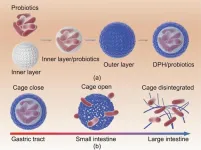(Press-News.org) Bottom Line: Intravenous immunoglobulin (IVIg) reduced the risk of severe infections by 90% in patients with multiple myeloma undergoing treatment with an anti-BCMA bispecific antibody.
Journal in Which the Study was Published: Blood Cancer Discovery, a journal of the American Association for Cancer Research (AACR)
Author: Guido Lancman, MD, a clinical associate at the Princess Margaret Cancer Centre of the University Health Network and an adjunct assistant professor at the University of Toronto
Background: Bispecific antibodies targeting the BCMA protein are increasingly employed in the treatment of multiple myeloma, with two agents recently approved by the U.S. Food and Drug Administration to treat this blood cancer.
While anti-BCMA bispecific antibodies have exhibited impressive efficacy against heavily pretreated multiple myeloma, there has been a high rate of serious, sometimes lethal, infections in patients receiving these therapies, explained Lancman.
Prior research from Lancman and colleagues suggested that the increased risk of infection during anti-BCMA therapy may be caused by treatment-induced depletion of the patient’s own antibodies, a condition known as hypogammaglobulinemia.
“Since antibodies are key components of the immune response, the inability to make antibodies leaves patients vulnerable to all sorts of viral and bacterial infections,” he noted. “As more and more patients start receiving BCMA-targeted bispecific antibodies, it is critical that physicians become aware of this toxicity and learn how to manage it.”
Lancman and colleagues hypothesized that supplementing patient antibody levels through intravenous (IV) delivery of donor antibodies—also known as immunoglobulins (Ig)—might mitigate their risk of infection.
How the Study was Conducted: To test this hypothesis, they conducted a retrospective analysis of 37 patients with heavily pretreated multiple myeloma who had received treatment with an anti-BCMA bispecific antibody. All patients were enrolled in one of four clinical trials at Mount Sinai Hospital between 2019 and 2022.
Results: Among the 26 patients who experienced clinical responses to an anti-BCMA bispecific antibody, 100% had severe hypogammaglobulinemia (defined as IgG levels below 200 mg/dL), and approximately 92% received IVIg at some point during treatment. During a combined 424 months of follow up, patients experienced a total of 118 infections, including 26 severe infections (grades 3-5) among 15 patients.
The authors found that the rate of severe infection was 90% lower during times when patients were receiving IVIg as compared to when they were not receiving IVIg. No other significant risk factors for infection were found in this study.
Author’s Comments: “This study demonstrates that IVIg is associated with a substantially reduced risk of serious infections in patients receiving anti-BCMA bispecific antibodies,” said Lancman. “Given the very high rates of serious infections and deaths in patients receiving these treatments, this study supports a proactive rather than a reactive approach, meaning initiation of IVIg prophylaxis from the beginning rather than waiting for patients to experience complications.”
Since the patients’ own antibodies did not recover while on treatment or during periods off treatment lasting up to 13 months, Lancman suggested that IVIg may need to be given throughout the duration of anti-BCMA bispecific antibody therapy and possibly for some time afterward.
However, he noted that alternative strategies will need to be considered if anti-BCMA therapies begin to be used for earlier lines of treatment. “It would not be feasible to maintain every multiple myeloma patient on IVIg indefinitely, so hopefully we will start to see more fixed-duration studies of these bispecific antibodies in order to allow the immune system the opportunity to recover.”
Study Limitations: Limitations of the study include the small sample size and the non-random use of IVIg. In addition, since the analysis was conducted on patients enrolled in clinical trials at a single institution, the results may not be representative of the general patient population.
Funding & Disclosures: The study was supported by the Polish National Agency for Academic Exchange. Lancman has served on advisory committees for Janssen Pharmaceuticals and Pfizer.
The article and an accompanying commentary will be available at the following links when the embargo lifts:
Article: https://aacrjournals.org/bloodcancerdiscov/article/doi/10.1158/2643-3230.BCD-23-0049
Commentary: https://aacrjournals.org/bloodcancerdiscov/article/doi/10.1158/2643-3230.BCD-23-0157
END
Intravenous immunoglobulin may prevent severe infections associated with anti-BCMA therapy for multiple myeloma
2023-09-28
ELSE PRESS RELEASES FROM THIS DATE:
Innovative double-layer polysaccharide hydrogel revolutionizes intestine-targeted oral delivery of probiotics
2023-09-28
In a groundbreaking study, a research team led by Changhu Xue and Xiangzhao Mao from the Ocean University of China has developed a remarkable double-layer polysaccharide hydrogel (DPH) that promises to revolutionize the field of intestine-targeted oral delivery of probiotics. The team’s findings, published in Engineering, demonstrate the potential of DPH to enhance the bioavailability, intestinal colonization, and overall effectiveness of probiotics in treating various diseases.
The research team’s study focused on addressing the challenges posed by the harsh gastrointestinal environment and the short retention ...
Ethics rules needed for human research on commercial spaceflights, panel says
2023-09-28
New guidelines are needed to assure that research on human subjects performed on commercial spaceflights is conducted ethically, a panel of experts say in a commentary appearing in the September 28 issue of the journal Science.
Their paper is titled Ethically cleared to launch?
Private companies are expected to fly thousands of people into space in the coming decades. Those aboard will include workers and passengers who will have the opportunity to participate in research studies. Such research is not only essential to assure the safety of future space travelers but often also addresses critical issues of human health in general.
Buț ...
A few essential genetic differences tailor flowers to bee or hummingbird pollinators
2023-09-28
Large differences in flower characteristics between wildflowers with different pollinators are achieved by a few key genetic differences, according to a study by Carolyn Wessinger at the University of South Carolina, US, and colleagues, publishing September 28th in the open access journal PLOS Biology.
Plants that rely on animal pollinators, such as insects or birds, have evolved distinctive suites of flower characteristics — known as “pollination syndromes” — that are tailored to the pollinator. For example, most plants in the ...
Dartmouth study removes human bias from debate over dinosaurs' demise
2023-09-28
To help resolve the scientific debate over whether it was a giant asteroid or volcanic eruptions that wiped out the dinosaurs and most other species 66 million years ago, Dartmouth researchers tried a new approach — they removed scientists from the debate and let the computers decide.
The researchers report in the journal Science a new modeling method powered by interconnected processors that can work through reams of geological and climate data without human input. They tasked nearly 130 processors with analyzing the fossil record in reverse to pinpoint the events and conditions that led to the Cretaceous–Paleogene (K–Pg) extinction event that ...
Cleared to launch? Ethical guidelines needed for human research in commercial spaceflight
2023-09-28
HOUSTON – (Sept. 28, 2023) – The commercial spaceflight industry is expanding opportunities for scientific research in space, but the industry needs clear ethical guidelines before human research is ready for liftoff. In a new policy paper published in Science, a global, multidisciplinary team of bioethicists, health policy experts, space health researchers, commercial spaceflight professionals and government regulators outlines potential ethical concerns facing the future of commercial space research and provides guiding principles ...
Genome-wide study of staghorn coral identifies genomic markers of disease resistance
2023-09-28
A genome-wide survey of highly endangered staghorn coral in the Caribbean has identified 10 genomic regions associated with resilience against white band disease – an emergent infectious disease responsible for killing up to 95% of Caribbean Acropora species, including staghorn corals (A. cervicornis). The findings could be used as a conservation tool to improve disease resistance in the wild and nursery stocks of staghorn corals used to repopulate damaged coral reefs throughout Caribbean waters. Over the last several decades, Earth’s reef corals have experienced unprecedented declines. Increased anthropogenic ...
Uncovered: the source of sticking power and virulence for an emerging fungal pathogen
2023-09-28
A previously uncharacterized adhesin protein specific to a human fungal pathogen first discovered in 2009 plays a crucial role in the fungus’s ability to colonize a variety of living and non-living surfaces, and in its virulence, according to a new study. “These findings [about Candida auris] offer insight into the genetics and molecular mechanisms by which [this fungus] mediates surface association, a trait critical to the increasing disease burden of this emerging pathogen,” write the authors. Since its first discovery in 2009, C. auris has become increasingly responsible for life-threatening infections in health care facilities worldwide. Outbreaks of ...
Science News Special Issue: Heat and Health
2023-09-28
From long-frozen and potentially dangerous pathogens awakening in Arctic permafrost to emerging heat-related hazards in human pregnancy, ongoing climate change presents new challenges for human health. In this Special Issue, Science’s News Department offers a collection of five news stories highlighting several facets of the complex intersection between heat, disease, and human health and the researchers seeking to understand related emerging threats.
In one Feature, Science Correspondent Kai Kupferschmidt discusses ...
Innovative approach reveals environmental mechanisms of the end-Cretaceous extinction
2023-09-28
A novel approach to a question that’s been widely investigated reveals more insights about the environmental forcings associated with the end-Cretaceous mass extinction, suggesting that volcanism and other biological changes imparted stress on the global carbon cycle across the Cretaceous/Paleogene (K/Pg) boundary. In addition to providing new insights into the factors that contributed to extinction, the approach could be useful in disentangling other complex perturbations in the Earth system and their associated climatic and biological impacts. The end-Cretaceous mass ...
Ethical guidelines needed before human research in commercial spaceflight is ready for liftoff
2023-09-28
A global, multidisciplinary team of bioethicists, health policy experts, commercial spaceflight professionals and space health researchers, including Rachael Seidler from the University of Florida, has developed guiding principles and best practices to help ensure human research conducted in space is safe and inclusive.
The proposed ethical guidelines were released Friday in a policy paper published in Science and are the result of a workshop held at the Banbury Center of Cold Spring Harbor Laboratory funded by the Translational ...


